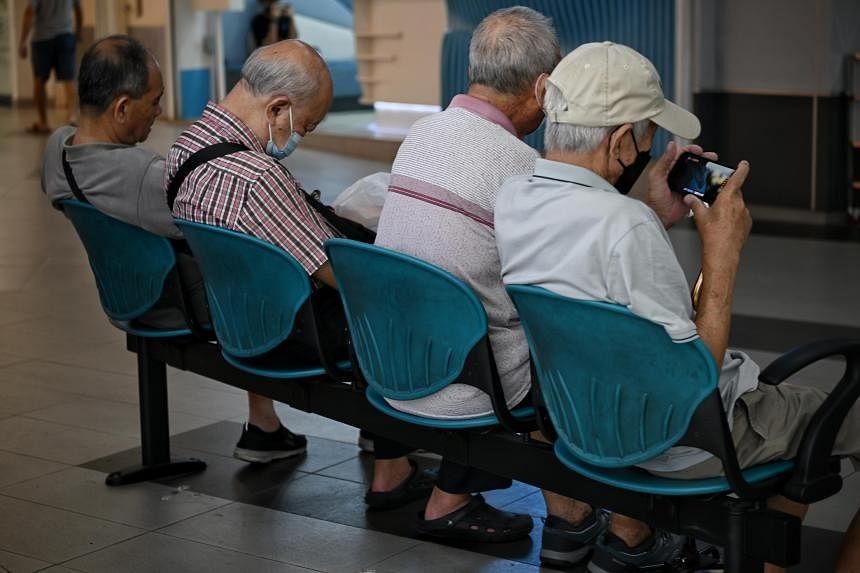
The latest Population in Brief report highlighted the increasing proportion of Singaporeans aged 65 and above. ST PHOTO: KUA CHEE SIONG
SINGAPORE: Amid changing family dynamics and a rapidly ageing society, Singapore will need to double down on investing in human capital and consider a more sustainable system of immigration.
These were what some experts said in reaction to the latest Population in Brief report released on Friday, which highlighted the increasing proportion of citizens aged 65 and above, from 11.7 per cent in 2013 to 19.1 per cent in 2023.
The annual report by the National Population and Talent Division also noted the resident total fertility rate (TFR) reaching a historic low of 1.04 in 2022, which coincided with the Year of the Tiger in the Chinese lunar calendar, and is generally associated with lower births among the Chinese.
Singapore Management University (SMU) sociology professor Paulin Straughan said trends like delaying marriage and having fewer children are apparent in many cities around the world.
“But as a city-state, Singapore will age much faster than other countries as it does not have a hinterland to balance out those trends. There may come a time when the TFR may even go below 1.
“Given these trends, Singapore must remain a top choice for surplus labour from around the region. We have to think about what it takes to maintain a buzz in our economy,” she added. “We want to ensure we are a multicultural and inclusive society even to foreigners who work among us.”
Dr Leong Chan-Hoong, head of policy development, evaluation and data analytics at global policy advisory firm Kantar Public, said: “The current immigration system could be refined to make it more predictable, sustainable, and acceptable to Singaporeans.”
He suggested a clear path for residency among countries with close historical ties with Singapore – Malaysia and Indonesia – or those where individuals have next-of-kin residing here.
Examples he cited included Malaysian students who study in local universities, professionals employed in sectors with shortage such as healthcare and engineering, or those with kinship ties to Singaporeans.
This unconditional pathway to residency can be reviewed five years later depending on demographic needs, he said, adding: “The short-term increase in prospective new permanent residents is less likely to cause social disruptions as we are culturally similar.”
Dr Tan Poh Lin, senior research fellow at the Institute of Policy Studies, said: “As our core population dwindles, we need to double down on investing in people to build up the store of human capital we can draw on to sustain the level of economic progress we’ve made.”
She added: “This is especially true for investments in early childhood, which is a more critical developmental period. Hence, addressing social equality and ensuring the credibility of a meritocratic system becomes more of a matter of survival, rather than just a social question.”
In developed countries, healthcare expenditure tends to jump sharply once people enter their 80s, she said. “But if longer life expectancies coincide with more years of healthy, productive life, being able to live longer could possibly even help to pay for an ageing society.”
Dr Tan said historical data suggests that there could be an uptick in births in the Year of the Dragon in 2024.
However, this could be overshadowed by economic gloom, concerns over geopolitical conflicts in the region or environmental fears, all of which are dominating the headlines these days, she added.
“Although it may be tempting to add to the hype of dragon years as an auspicious time to have more children, in the hopes of encouraging births, there is evidence that the phenomenon tends to be more about timing rather than total births over a lifetime,” said Dr Tan.
“If this is in fact the case, it is actually a bad idea to have births bunched up in a single year, which would ultimately create additional sources of competition and stress for parents, costly administrative burdens for the nation, and most importantly, potential negative impacts on the children themselves.”
Prof Straughan said the dragon year is unlikely to make any palpable difference to Singapore’s TFR.
“The writing is on the wall. Between the 1990s and now, the Government has stepped in and done what it could in terms of incentives to have children... but there are contesting needs for state resources.”
The plummeting birth rate also reflects the increasing difficulty of raising children and having careers, she added. “Because most parents now choose to have children, they feel immense pressure to do the best by them. They then feel they cannot afford to give more of themselves to any more children.”
Dr Leong said Singaporeans are concerned about the global economic environment and the cost of living when it comes to parenthood.
“While the financial support schemes for parenthood are helpful, there is also a need to address the runaway expectations in desired lifestyles and parents’ anxiety over competition in the education system. New education policies such as subject-based banding in secondary school and priority housing for young families may help but the impact will only be felt 10, 20 years from now,” he added. - The Straits Times/ANN



































